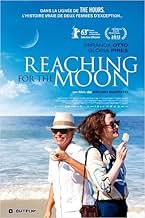CALIFICACIÓN DE IMDb
7.0/10
3.7 k
TU CALIFICACIÓN
Crónica de la trágica historia de amor entre la poetisa estadounidense Elizabeth Bishop y la arquitecta brasileña Lota de Macedo Soares.Crónica de la trágica historia de amor entre la poetisa estadounidense Elizabeth Bishop y la arquitecta brasileña Lota de Macedo Soares.Crónica de la trágica historia de amor entre la poetisa estadounidense Elizabeth Bishop y la arquitecta brasileña Lota de Macedo Soares.
- Dirección
- Guionistas
- Elenco
- Premios
- 9 premios ganados y 21 nominaciones en total
Opiniones destacadas
Overall had a very good impression of the movie. I think it balanced well certain aspects... especially in the portrayal of their romance. They avoided being overly prudish and that made the romance seem more real. Without getting too kinky and losing focus. The contrast between the two characters is really interesting.
The actress Gloria Pires who portrays Lota de Macedo Soares has worked in dozens of soap operas and that sometimes comes through in her films, but not this time thankfully. She so embodies the force of nature that was Lota and this comes through the screen very well. I felt like I was seeing a member of my old Rio family... so her amazing portrayal was certainly the highlight of the film for me.
PS: Being a Macedo Soares myself (but too young to have known Lota)... there might be a bit of bias in my review.
The actress Gloria Pires who portrays Lota de Macedo Soares has worked in dozens of soap operas and that sometimes comes through in her films, but not this time thankfully. She so embodies the force of nature that was Lota and this comes through the screen very well. I felt like I was seeing a member of my old Rio family... so her amazing portrayal was certainly the highlight of the film for me.
PS: Being a Macedo Soares myself (but too young to have known Lota)... there might be a bit of bias in my review.
This is a beautifully filmed movie about the lives of two exceptional women whose lives collided in the early 50s and went on for 17 years. Oh - it's a true story, BTW.
The locations are spectacular in a quiet way and worth the watch on their own. They added one star.
I am ashamed to say I was not aware of Elizabeth Bishop. Now I am looking forward to reading her material.
Hope you enjoy this film.
The locations are spectacular in a quiet way and worth the watch on their own. They added one star.
I am ashamed to say I was not aware of Elizabeth Bishop. Now I am looking forward to reading her material.
Hope you enjoy this film.
Lovely. A story here that is not overshadowed by the relationships, politics, or agenda. It is, simply beautifully filmed, the beaches of Rio De Janeiro, the beautiful home Lota has deigned in part to accommodate her new lover, poet Elizabeth Bishop, completely played by Miranda Otto.
Otto is at once restrained yet yearning, a Vassar graduate visiting her friend, who initially is puzzled (and indeed overwhelmed) by the beauty and passion of South America.
She plays the American New England spinster type well, without a stereotype here. We can feel she wants, and NEEDS to break free from societal restraints.
The filming of the rain forests, the owls at night, the visuals are incredible. Lota Soares was politically connected and designed the park near Carioca beach, the title infers, reaching for the moon has so may more connotations for each woman.
What is most refreshing is the way this film is written, sensitive to the issues each woman experiences, it is an individual and a private journey.
The actress portraying Carlotta Soares is affecting and sad, and Miranda Otto is quite believable as Bishop. The story is beautiful and sad, and the scenery of Brazil is not to be missed, simply beautiful, and beautifully filmed. 10/10
Otto is at once restrained yet yearning, a Vassar graduate visiting her friend, who initially is puzzled (and indeed overwhelmed) by the beauty and passion of South America.
She plays the American New England spinster type well, without a stereotype here. We can feel she wants, and NEEDS to break free from societal restraints.
The filming of the rain forests, the owls at night, the visuals are incredible. Lota Soares was politically connected and designed the park near Carioca beach, the title infers, reaching for the moon has so may more connotations for each woman.
What is most refreshing is the way this film is written, sensitive to the issues each woman experiences, it is an individual and a private journey.
The actress portraying Carlotta Soares is affecting and sad, and Miranda Otto is quite believable as Bishop. The story is beautiful and sad, and the scenery of Brazil is not to be missed, simply beautiful, and beautifully filmed. 10/10
Reaching for the Moon (2013)
Wonderful! The story of the Brazilian years of the great North American poet, Elizabeth Bishop. There are so many beautiful aspects to the characters, their setting, and their relationships it's hard to know where to begin. And even better, on top of all this, is the historical recreation of the times, and the changing political climate of Brazil. It's touching and uplifting and tragic.
The original title of this is "Flores Raras" because these were indeed rare people, and doing beautiful things. And yes, they were reaching for the moon but you might rather say they reached the moon. Succeeding at something is more than literally fulfilling.
The plot has a slightly meandering, unfamiliar arc through the main events, and there are times when you think one thing and then suddenly another happens. Don't blame bad writing, but rather realize that this is how life is, and how it really was. Remember as well that these are artists of privilege at work, they have money and education and act with a kind of license and liberation that we all should feel. And so it's unpredictable.
As a kind of true insight into the poetic process you might find few parallels in the movies. You learn their temperaments, and how circumstances make the artist and the poet come to their best. The intimate circumstances are about love, a really true deep love that grows between these two women. Their professional needs reinforce and conflict with their personal needs, but they make it work.
The outside circumstances are hard to understand from 2014. Brazil was once a very different country, filled with far more freedom and sense of liberation. (This seems to be a direction that are pointed in again, though going through fits and starts.) But the world in post-War Brazil was one of possibility. It was a haven (not just for ex-Nazis) and a growing "New World," but it was also stuffed with poverty (which the movie ignores), a legacy still at hand.
And this is exciting stuff. The movie moves mostly through the confines of their big, gorgeous estate in the hills, but it also shows us the city, and the larger world. So Bishop and Lota de Macedo Soares, an important architect of the era. grow and suffer and see their world fall apart around them (Brazil fell under dictatorship in the mid 1960s). It's filmed with utter beauty, the acting is sharp and convincing, and the writing (not surprisingly) is fluid and tight. Great stuff.
Wonderful! The story of the Brazilian years of the great North American poet, Elizabeth Bishop. There are so many beautiful aspects to the characters, their setting, and their relationships it's hard to know where to begin. And even better, on top of all this, is the historical recreation of the times, and the changing political climate of Brazil. It's touching and uplifting and tragic.
The original title of this is "Flores Raras" because these were indeed rare people, and doing beautiful things. And yes, they were reaching for the moon but you might rather say they reached the moon. Succeeding at something is more than literally fulfilling.
The plot has a slightly meandering, unfamiliar arc through the main events, and there are times when you think one thing and then suddenly another happens. Don't blame bad writing, but rather realize that this is how life is, and how it really was. Remember as well that these are artists of privilege at work, they have money and education and act with a kind of license and liberation that we all should feel. And so it's unpredictable.
As a kind of true insight into the poetic process you might find few parallels in the movies. You learn their temperaments, and how circumstances make the artist and the poet come to their best. The intimate circumstances are about love, a really true deep love that grows between these two women. Their professional needs reinforce and conflict with their personal needs, but they make it work.
The outside circumstances are hard to understand from 2014. Brazil was once a very different country, filled with far more freedom and sense of liberation. (This seems to be a direction that are pointed in again, though going through fits and starts.) But the world in post-War Brazil was one of possibility. It was a haven (not just for ex-Nazis) and a growing "New World," but it was also stuffed with poverty (which the movie ignores), a legacy still at hand.
And this is exciting stuff. The movie moves mostly through the confines of their big, gorgeous estate in the hills, but it also shows us the city, and the larger world. So Bishop and Lota de Macedo Soares, an important architect of the era. grow and suffer and see their world fall apart around them (Brazil fell under dictatorship in the mid 1960s). It's filmed with utter beauty, the acting is sharp and convincing, and the writing (not surprisingly) is fluid and tight. Great stuff.
Glória Pires, as Lota de Macedo Soares, dominates this film to such a degree, we wonder why it's focus is the poet Elizabeth Bishop, brittlely acted by Miranda Otto. I suppose you could argue, "That's how it was both in life and their relationship," but as a viewer, our interest begs to know more about Soares.
This is a beautiful film about very talented, privileged people. An icey, supposedly repressed Bishop finds herself in the hot house of the Brazilian estate of Soares. Their torrid relationship is the subject of the film. We forget how dangerous same sex relationships were at the time, and film doesn't try to recreate that peril. And that makes some of the dynamics that plague the relationship a question. Why is Bishop able to sail above disastrous break-up; why is Soares destroyed.
What is fascinating is the liberation that the Soares estate, Petrópolis, provides. It's an Eden-like setting where the relationship flourishes. But we want more than "extraordinary people" have the same challenges in relationships as we, the ordinary. When Pulitzer Prises or major architectural commissions are awarded, the changes in dymanics that it brings aren't really explored. And I think these extraordinaryly talented people deserve a deeper, perhaps darker, film given the times they lived in and pressures it brought.
This is a beautiful film about very talented, privileged people. An icey, supposedly repressed Bishop finds herself in the hot house of the Brazilian estate of Soares. Their torrid relationship is the subject of the film. We forget how dangerous same sex relationships were at the time, and film doesn't try to recreate that peril. And that makes some of the dynamics that plague the relationship a question. Why is Bishop able to sail above disastrous break-up; why is Soares destroyed.
What is fascinating is the liberation that the Soares estate, Petrópolis, provides. It's an Eden-like setting where the relationship flourishes. But we want more than "extraordinary people" have the same challenges in relationships as we, the ordinary. When Pulitzer Prises or major architectural commissions are awarded, the changes in dymanics that it brings aren't really explored. And I think these extraordinaryly talented people deserve a deeper, perhaps darker, film given the times they lived in and pressures it brought.
¿Sabías que…?
- TriviaFour paragraphs appear between the end of the film and the beginning of the credits.
1. "Few women write major poetry. Only four stand with our best men: Emily Dickinson, Marianne Moore, Elizabeth Bishop and Sylvia Plath." - Robert Lowell
2. "I'd rather be called the 'The 16th Poet' with no reference to my sex, than one of 4 women - even if the other three are pretty good." - Elizabeth Bishop
3. Elizabeth Bishop died in 1979 in the United States. She is considered on the most important poets of the English language.
4. In 2012, UNESCO declared the city of Rio De Janeiro a World Heritage site. The Flamengo Park is one of its main attractions.
- ErroresOpening in 1951 but Bobby Vinton singing Blue Velvet was not until 1963.
- Citas
Elizabeth Bishop: It's OK. I'm not drunk. I'm just crying in English.
- Créditos curiososNine of the main performers (the first 10) are listed in the credits without the name of their character. Only Treat Williams is credited as his character, Robert Lowell.
- ConexionesReferenced in Programa do Jô: Episode dated 26 August 2013 (2013)
Selecciones populares
Inicia sesión para calificar y agrega a la lista de videos para obtener recomendaciones personalizadas
- How long is Reaching for the Moon?Con tecnología de Alexa
Detalles
- Fecha de lanzamiento
- País de origen
- Sitios oficiales
- Idiomas
- También se conoce como
- Reaching for the Moon
- Locaciones de filmación
- Productoras
- Ver más créditos de la compañía en IMDbPro
Taquilla
- Total en EE. UU. y Canadá
- USD 45,502
- Fin de semana de estreno en EE. UU. y Canadá
- USD 14,573
- 10 nov 2013
- Total a nivel mundial
- USD 1,534,391
- Tiempo de ejecución1 hora 58 minutos
- Color
- Relación de aspecto
- 1.85 : 1
Contribuir a esta página
Sugiere una edición o agrega el contenido que falta

Principales brechas de datos
By what name was Tocando la luna (2013) officially released in India in English?
Responda

























